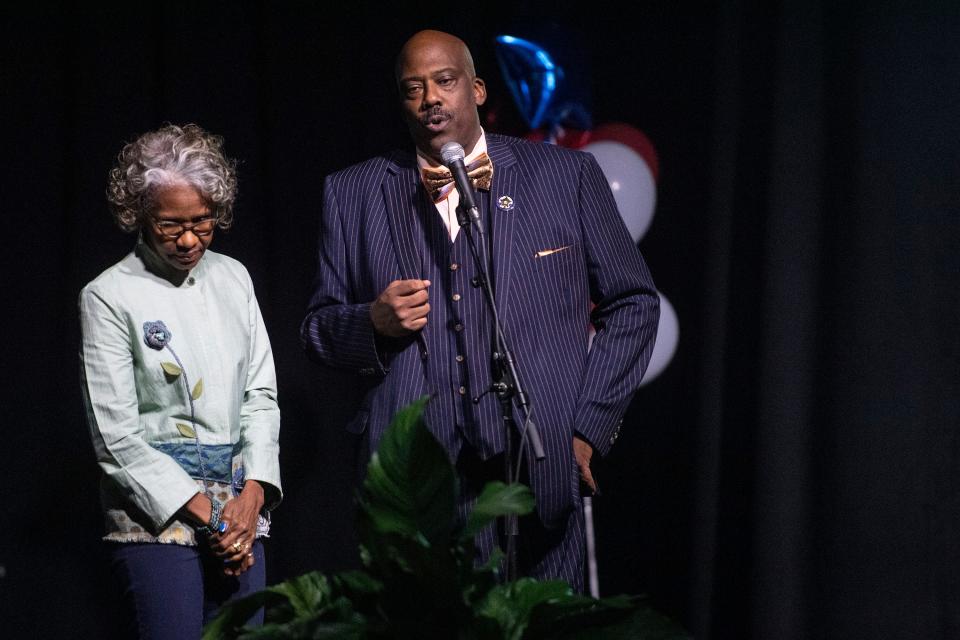Democrat Moore, incoming District 2 Buncombe commissioner, talks vision on growth, safety

ASHEVILLE - Martin Moore is carrying a variety of experiences into his role as freshman Buncombe County commissioner for District 2, which encompasses the southwestern part of the county including Enka/Candler.
The 34-year-old Democratic challenger to a seat held by Republican Robert Pressley since 2016 will be sworn in come early December. Moore won over Pressley with an unofficial 55% of the vote to 45% or 19,780 votes to 16,213. Election results are set to be certified Nov. 18.
Moore’s first term is a kind of shakeup for Buncombe County Board of Commissioners, which in recent history has always had at least one Republican.
Now it’s completely Democrat.
But that hasn’t been the focus of his campaign, nor will it be the driving force of his service, Moore said.
Elections:NC House, Senate races: Mayfield, most Democrats win, but State Sen. Daniel keeps seat
Elections:Asheville's 1st elected school board: Ray wins night with Thornburg, Strimer, English-Kelly
“The talks that I had with folks were often about policy, not party,” Moore said in a Nov. 9 interview with the Citizen Times. “When we discuss public safety, affordable housing, the cost of living, education, clean water, clean air, these are things that resonate with everyone. And I suppose we can put labels on that and say that the Democrats have made that more of a priority. But in a local race like this, while I'm thankful that my party is well represented, I will say I think people responded to the fact that we put forth a plan, we put forth ideas about how we can do things better.”
Knocking on more than 1,000 doors, not partisan lines or personality, Moore said, was key for his campaign.
“I'll be candid with you: I think that we were out in our community,” he said. “This effort has resonated more with people more than any single party.”
Election Day coverage:
Asheville council race: Ullman wins night, incumbents Smith and Mosley retain seats
NC House, Senate races: Mayfield, most Democrats win, but State Sen. Daniel keeps seat
Madison County school board remains intact as chair Blevins, members Ray and Wyatt win
Miller victorious for 2nd term in Buncombe County Sheriff's race
Moore brings with him experience as an attorney — he practices business and civil litigation, criminal defense and real property disputes, according to his website — and service as chair of two Buncombe boards: the Board of Adjustment and, until recently, the Juvenile Crime Prevention Council.
Crafting growth-related policy
Asked about the overlapping mechanics of his Board of Adjustment role and his commissioner position, Moore again pointed to policy.
“As commissioner, I believe the focus will be much more on what policy ought to be as opposed to making quasi-judicial decisions based on what the County Commission sets the standards for, and zoning ordinance,” he said. “I'm looking forward to a lot more discussion around policy and how we can improve our processes, as opposed to just simply executing them.”
Moore said his service on that board, which started in 2018, gave him an opportunity to understand the complexity of Buncombe’s rules around housing.
Technically, the board “interprets zoning maps, hears and decides appeals from any order or decision of the zoning administrator, grants conditional use permits and planned unit development permits and authorizes variances in requirements of the zoning, junkyard and off-premise sign ordinances,” according to its definition on Buncombe's website.
Related:Report to spell out whether Buncombe can legally tax Airbnbs, Vrbos at higher rate
Practically, Moore said, it doesn’t have “a ton of discretion to make its own decisions based on the issues that the community has expressed they care about.”
But as a commissioner he’ll be able to help shape policy on a critical issue that has taken up a significant portion of Board of Commissioners discussion in 2022: affordable housing and how to make more of it in the coming decade.
“As county commissioners, we have a lot more tools to address ... what I personally think (the public) is most concerned about,” Moore said. “I'm really looking forward to making sure that the public has a voice and knows that they're able to express their concerns and, honestly, optimism about what affordable housing can look like in Buncombe County.

There is currently no requirement for developers to make new housing affordable, though Buncombe's Nathan Pennington noted in a recent interview the county is considering that as part of its 2043 Comprehensive Plan, which Moore extolled.
“We do have a housing crisis and I think that there are going to be some uncomfortable conversations. But I think there'll be productive and overall positive conversations when we make sure everyone knows what playbook we're reading from.”

Housing is a broad, complex and multifaceted discussion across the U.S. — Buncombe is no exception. Party affiliation, even within Board of Commissioners, does not guarantee consensus about how to address the issues.
“We have some very complex statutes and ordinances that we have to follow. There are a lot of rules that the state sets for the localities that we just can't break," Moore said.
"But I do believe that we can have a lot more productive conversations. I've been excited to talk to the public and my fellow commissioners about how we interpret those rules and how we find solutions that are going to work for us. My experience in private practice on land use issues and zoning policies I'm hopeful will be a tremendous asset for the board as we're navigating a very complex potential minefield of really weird regulations the state chooses to put on this.”
Growth was one of two topics Moore said he was excited to dive into right away.
More:As $70M Buncombe bond referendum gets green light from voters, how much will you pay?
Related:Miller victorious for 2nd term in Buncombe County Sheriff's race
Related:2,000-camera network feeding to Sheriff's Office could get bigger this year. Here's why.
'Focused on efficacy'
Public safety is another topic Moore has grown close to during his time on the JCPC.
Asked how Buncombe can be a leader in public safety and leverage the resources and programs created by newly reelected Sheriff Quentin Miller, Moore said he anticipates continuing collaboration he’s already started.
“I very much respect Sheriff Miller and we've already had many great talks about what we're capable of in Buncombe County,” Moore said.

“I believe that the Sheriff brings a willingness and experience and knowledge in this area. hear that. It's really about just us putting our heads together and getting it done. We have the community partners. I think this election shows that we have the community's trust: They've made their voices heard by electing candidates who are taking innovative approaches towards public safety. We're focused on efficacy: That was a big part of our campaign messaging. And I want to see that executed on as we go forward. And I think the sheriff has expressed interest in us being creative.”
Moore will sit on a board that is voting on decisions regarding more than $16 million in funds from the national opioid settlement. Locally, the county has a clear, community-informed decision about where that money is going and why.
Recent data collected by the sheriff’s office in collaboration with Register of Deeds Drew Reisinger found 2021 was the deadliest year on record for overdose deaths in Buncombe, with 161 deaths. The second most deadly year was 2017, when there were 155 overdose deaths.
“The opioid funds could open up opportunities for us (to focus) on mental health treatment and drug treatment for individuals, and comprehensive stability for our neighbors who are suffering from this terrible epidemic,” Moore said.
More:Jail death: Family sues Buncombe sheriff, others, says detainee needed seizure medication
More:Autopsies on 2 Buncombe jail deaths: 'bag of drugs' and pneumonia
More:State's deadliest jail: Buncombe has worst death rate, Citizen Times investigation shows
“Having worked in the criminal justice world, we're dealing with really complex problems, and we need innovative thinkers at every single seat here. It's not just about county commission, it's not just about the sheriff, but all of us getting on the same page and committing to finding something that's going to benefit our community long term and not just talking about the problem, but really implementing the ideas that are going to be effective in combating violence and combating the opioid epidemic and, honestly, giving the people of Buncombe County, some folks to believe in in terms of us being able to set the standards in the state and not just follow a very sad trend that's been happening in our country.”
Related:Search warrant: Asheville High student accused of rape, sharing Snapchat visuals
Moore has an eye for broad-stroke issues but he’s also dedicated to serving his constituents in District 2. They’ve talked to him about backyard problems and he’s prepared to put those on the table.
“From my conversations with folks who have lived here for quite some time, many folks agree that we're due for some infrastructure upgrades,” he said. “We’ve changed a lot as a county, and we're seeing the makeup of Candler obviously look a lot different than it did 50 years ago. The one concern that has remained steady is that we need a representative who's going to step up and account for the simple things, the quality-of-life things that we deal with in Candler and Enka.”
Moore said people there feel those issues had been ignored for some time.
“I think that we can make a lot of progress and with some very small tweaks, and a few phone calls make life a little bit better for the folks who might have otherwise felt left behind,” he added.
Andrew Jones is an investigative reporter for the Asheville Citizen Times, part of the USA TODAY Network. Reach him at @arjonesreports on Facebook and Twitter, 828-226-6203 or arjones@citizentimes.com. Please help support this type of journalism with a subscription to the Citizen Times.
This article originally appeared on Asheville Citizen Times: Newly elected Buncombe commissioner Martin Moore talks growth, safety

